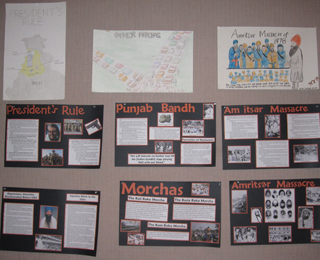Dallas, United States (November 16, 2012): According to report published on the “The Daily Campus” website Southern Methodist University’s Sikh Student Association (SSA) organized an event called “Human Rights: A Sikh Story” to commemorate the 28th anniversary of the 1984 Sikh Massacre in India. The even also marked discussion regarding the Wisconsin shooting at the Oak Creek (Wisconsin) Sikh Temple Gurudwara Sahib in August, 2012.
According to report, published on November 16, 2012 states:- Gurvinder Singh, director of United Sikhs and vice president of the Dallas American Civil Liberties Union, and professor John Vernon, adjunct faculty for Dedman School of Law, were the guest speakers at the event.
Gurvinder Singh gave a brief history of the massacre that left thousands of Sikhs brutally murdered in India. He claims it to be the largest military operation conducted by any country toward its own citizens to date, adds the report.
He reportedly blamed the Indian media for portraying the Sikhs as terrorists and extremists as it fueled the support for killing innocent Sikhs all over India. He said it was even more heartbreaking to see that nobody has been convicted for the killings that left entire families, including women, children and elderly, wiped out.
Remarking on the ease with which big governments have been able to target a certain sect, professor Vernon asked the audience if they ever wondered why was it “so easy to round up the [Jews in World War II or] Sikhs” in this case. He said it was because of data processing.
“The law is far behind technology. It is very easy to data-mine [for big governments and target a certain people],” Vernon said.
For that reason, he urged the audience to acquaint themselves with the policies they are voting for. Citing Elie Wiesel, he said, “There may be times when we are powerless to prevent injustice, but there must never be a time when we fail to protest.”
Iterating her passion toward human rights issues, Afsana Qurishi, majoring in international studies at SMU, said, “As a Muslim, it hurts my community just as much as it hurts the Sikh community.”
Karma Orfaly, a second generation Syrian and a freshman at SMU, reportedly said, “I’m glad they still talk about what happened years ago. In 1982, there was a mass killing in Syria where over 40,000 people died, but I did not know about it until the Syrian revolution started. [It is imperative] that we don’t forget these events because we cannot let them happen again.”
“This event helped in spreading awareness against the injustice toward us. Now these people will help in dispelling ignorance [which incite hate crimes] with education” remarked Sarwinder Singh, a student at University of Texas at Dallas.
Singh also appreciated the cultural element and input Vernon brought to the event.
“It was [also] refreshing to see that there was a person of another culture and race present – a person who has no relation with Sikhs whatsoever. That means a lot to me as a Sikh,” Singh said.
Parminder Deo, president of SSA, said the organization wanted to give the event a broader focus. They decided to incorporate the Wisconsin Sikh Temple shooting with the 1984 Sikh Massacre and make a broader impact on the human rights issues in the Sikh community.
By doing so, they aimed to attract people from all backgrounds to spread more awareness.
“We wanted a diverse group to attend the event, not just the Sikhs,” Deo reportedly said.

